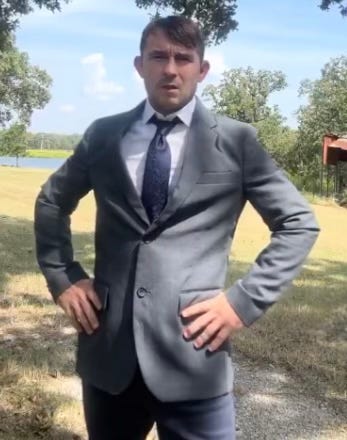The Charlie Effect: How We Too Can Open Hearts and Change Minds
Rosh Hashanah reflections inspired by Christian grace and a Buddhist parable about what we “carry in our cups.”


Each year, I write my High Holiday reflections as an offering — a search for inspiration that might move us to be blessings in a world that needs them. This Rosh Hashanah message struck a chord, so I’m sharing it here — at the end of a momentous week of hope and release, and on the eve of Shabbat — a little Sabbath reading to help recharge your spiritual batteries.
Below is the video of my Rosh Hashanah remarks and below that is a lightly edited version of what I shared that evening.
My Rosh Hashanah remarks, delivered September 23, 2025, as part of our annual High Holiday gathering with friends and family — co-led with my gifted spiritual partner and friend, Hilary — what we now call Temple HilMel.
In this sixth year of sermonizing at Temple HilMel, I thought I had it down. My plan was to spend Elul — the month of preparation prior to Rosh Hashanah — reading, reflecting, and gathering inspiration.
But grief — and events — got in the way.
First, my heart was heavy. I lost two dear friends this summer, and grief dulls the mind. Then came the assassination of Charlie Kirk — a 31-year-old husband and father of two. I’ve been haunted, distracted, heartsick… and confused.
What kind of world are we living in, when a straight-A student from a good family can become an assassin whose bullets were engraved with the words, “Hey fascist! Catch!
Why is it that some tragedies — like 9/11 — provoke near-universal condemnation, while others — like October 7th or Charlie Kirk’s murder — are met with equivocation, even justification?
To collect my thoughts and steady myself, I did what I always do: I wrote. Over the past week, I poured myself into an essay for my Substack, published just yesterday. It’s called Prove Him Right. And it asks a simple but urgent question:
Can we restore the American Idea — the radical notion that people of differing backgrounds, beliefs, races, and religions can come together in the public square, not to destroy one another, but to forge a “more perfect union?”
So, I decided to use my essay as a launching pad for my Rosh Hashanah message. Its themes of forgiveness, hope, and dialogue are precisely what Rosh Hashanah is about: beginning again — saying Hineini, here I am — to be present and prepared to repair what is broken.
That was Charlie Kirk’s rationale for his work on college campuses, which he called the “Prove Me Wrong” tour. He welcomed questions and engaged in thoughtful dialogue with “friendlies” and “hostiles” alike.
As Charlie explained:
“When people stop talking, really bad stuff starts. When marriages stop talking, divorce happens. When civilizations stop talking, civil war ensues. When you stop having a human connection with someone you disagree with, it becomes a lot easier to want to commit violence against that group.”
Isn’t that the same dynamic we saw in the morally confused responses to October 7th — and again, to Charlie’s murder?
Since Charlie’s assassination, millions have watched him online and noticed the civility with which he engaged. That’s heartening, because what the world needs now is more curiosity and less judgmental stridency.
The feedback I’ve received on my Substack gives me hope that words still have power — to touch, to heal, to build bridges. Even the private messages from people too afraid to comment publicly remind me that there is a hunger for dialogue.
It’s said that crisis and challenge are really moments of opportunity. So, in the face of violence, we can choose dialogue. In the face of judgment, we can choose forgiveness. And in the face of despair, we can choose hope.
And if this were Torah, the rabbis would say it’s midrash — commentary that points to the essential question: What does this moment demand of us?
Hineini — Here I Am
Our tradition gives us a simple and powerful answer. A single Hebrew word: Hineini. Here I am.
Hineini is the word Abraham utters when God calls him before the binding of his son Isaac — that most difficult test of faith.
Hineini is the word Moses says at the burning bush — aflame but not consumed — when God interrupts his ordinary life with an extraordinary mission he doubted he could fulfill.
Hineini is the word a confused Samuel whispers when God first calls him, teaching that hineini is not merely about showing up – it’s about truly listening, especially when we are uncertain.
Hineini is the word Isaiah says when he’s called to speak God’s message to the people. Concerned they won’t listen, Isaiah still declares: “Hineini. Send me,” demonstrating courage, even when the path ahead is hard.
None knew what to expect, but all chose to show up fully – to be present.
That same word — Hineini — was used by Charlie.
In her eulogy, Erika Kirk recounted how, two years ago, Charlie was speaking extemporaneously and quoted Isaiah’s words: “Here I am, Lord. Send me.”
Backstage afterward, Erika teased him:
“Charlie, baby, please talk to me before you say something like that! Because when you pray those words, God takes you up on them.”
She was right. Hineini is not a casual word; it’s a declaration of courage and commitment. Erika believed God accepted Charlie’s offering when he said, “Here I am, use me.”
Whatever one’s views of Charlie’s politics, no one should face his fate for saying Hineini.
For us, reclaiming the American Idea and fulfilling our Judeo-Christian heritage means something profoundly different: answering the call to serve, to step forward, to be present — not with martyrdom, but with commitment and responsibility.
And that is exactly what Rosh Hashanah asks of us – to stand before God and before one another and say: Hineini. Here I am. Ready to listen, ready to forgive, ready to repair what is broken.
The Courage to Forgive
But living out Hineini requires something difficult and especially urgent: the courage to forgive.
Sometimes forgiveness can be playful. Consider the story of composer Giacomo Puccini. He had a tradition of sending cakes to his friends every Christmas. One year, after quarreling with the conductor Arturo Toscanini, he tried to cancel the order for Toscanini’s cake. But it was too late. The cake had already been delivered. So, Puccini sent a telegram:
“Cake sent by mistake.”
Toscanini shot back:
“Cake eaten by mistake.”
The quarrel ended in humor, and the friendship endured with grace.
Consider the story of Joseph. He’d been betrayed by his brothers, sold into slavery, and unjustly imprisoned. If anyone had reason to be resentful, it was Joseph. But when his brothers went to Egypt to beg him for food, he forgave.
“Do not be troubled that you sold me here,” Joseph told them, “for it was to preserve life that God sent me to Egypt.”
Joseph chose to prioritize his mission as a patriarch of the Jewish people instead of dwelling on betrayal. He chose reconciliation instead of revenge. And by forgiving, he kept his family — and the future of the Jewish people — alive.
And forgiveness was powerfully on display in Erika Kirk’s stunning eulogy of her husband. Drawing on her faith, she recalled Jesus saying of his betrayers, “they know not what they do.” And she explained her own reluctant decision to forgive his assassin:
“That is what Christ did. That is what Charlie would do. The answer to hate is not hate.”
If Erika Kirk could summon forgiveness in such an unimaginable moment, surely we can forgive slights that pale by comparison.
Even President Trump, in his remarks following Erika’s, acknowledged that perhaps he, too, should show more grace.
The Charlie Effect
Some fear persuasion is no longer possible. Bill Bennett worried that Charlie Kirk might have been the last to believe it is. But the “Charlie Effect” is proving otherwise: people have been thinking again — even changing their minds.
Charlie may have started out as a “prove the other side wrong” debater, but as he matured, he learned that debate is for the best talker, while persuasion is for the best listener. By asking questions, modeling respect, and building trust, he opened hearts — and hearts open minds.
The surge of personal “turning point” testimonies even prompted Cardinal Timothy Dolan to call Charlie a modern-day St. Paul, saying he brought faith and conviction back into the public square where our founders intended it to be.
Wouldn’t the country — and especially our youth — be better off if more Americans focused on the values Charlie preached: God, family, country? Wouldn’t the assassin have been better off if he’d reached for a microphone instead of his grandfather’s hunting rifle?
He too might have been awakened — like Robbie Woodson, whose moving account was captured in a viral video. Woodson stands before the camera in his first-ever suit, bought by his wife. With tears welling, he admitted he had never been religious but vowed to be a better husband, father, and man — and to wear that suit to church.
“Charlie made me feel this way,” he said.

And that is what this season calls us to do: to help others feel their dignity, their worth, their humanity. To answer God’s call — and one another’s — by saying Hineini. Here I am.
What’s in Your Cup?
A Buddhist monk once asked his students:
“If you’re carrying a cup of coffee and someone bumps into you, why do you spill coffee?”
They answered: “Because someone bumped me.”
The monk replied: “No — you spilled coffee because that’s what was in your cup. If you had been carrying water, you would have spilled water.”
He continued:
“When life shakes you — as it always will — what spills out is whatever you are carrying. If you carry fear, anger, resentment, that’s what will spill. But if you carry love, compassion, kindness, forgiveness, that’s what will spill.”
So… the question for us this Rosh Hashanah is simple: What are we carrying in our cups?
When we are shaken — and we will be — will anger and bitterness spill out, or love and compassion? Will it be judgment, or forgiveness? Division, or hope?
The shofar we are about to hear is a cry that interrupts our lives to demand a response from us. But importantly, it is also a cry of renewal, reminding us that we can begin again in this new year, 5786.
May this year be the year we say Hineini.
May it be the year our cups overflow with love – and the year Israel’s hostages are finally returned to their families.
And may we be inscribed not only in the Book of Life, but in one another’s hearts.
L’shanah tovah!
I’d love to hear your thoughts in the comments! Click below to make one:
Coming next: my Yom Kippur reflections on the antidote to antisemitism — the time-tested ingredient that has filled the cups of Jews throughout the millennia, whenever the world has “shaken” them. Given this week’s stunning Gaza deal, those reflections feel timelier than ever.
If you were moved by the Buddhist parable that closes these Rosh Hashanah reflections, my Yom Kippur remarks draw on another wise Buddhist story.


Melanie your missives are always beautifully expressed, but this most recent one is GOD-BREATHED.
Thank you.
Susan Mauntel in Sarasota👩🦰🙏❤️
Once again Melanie your words are a valuable reminder that we can open our hearts and minds in a beautifully written piece. Thank you!